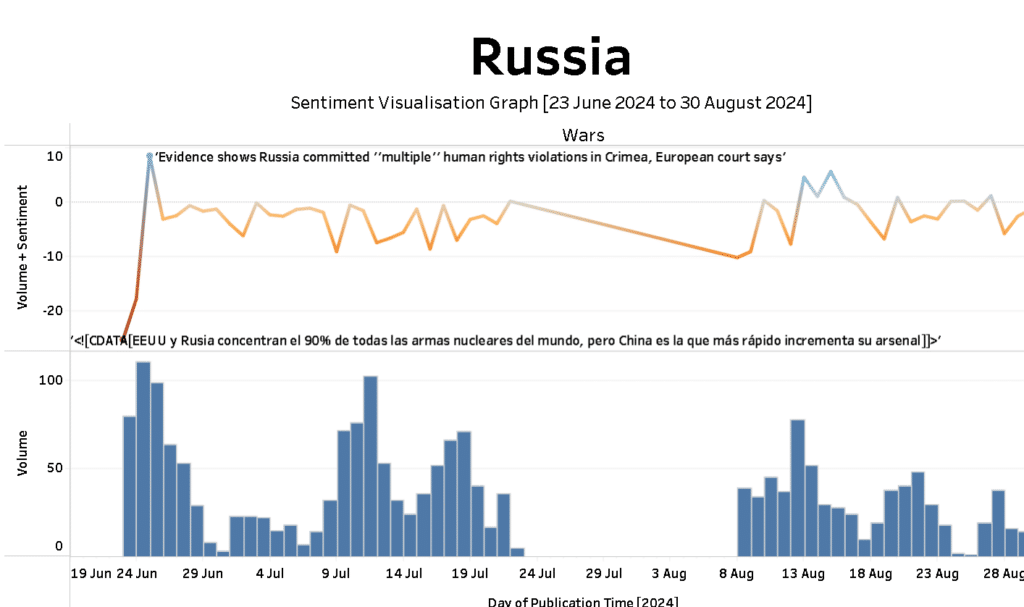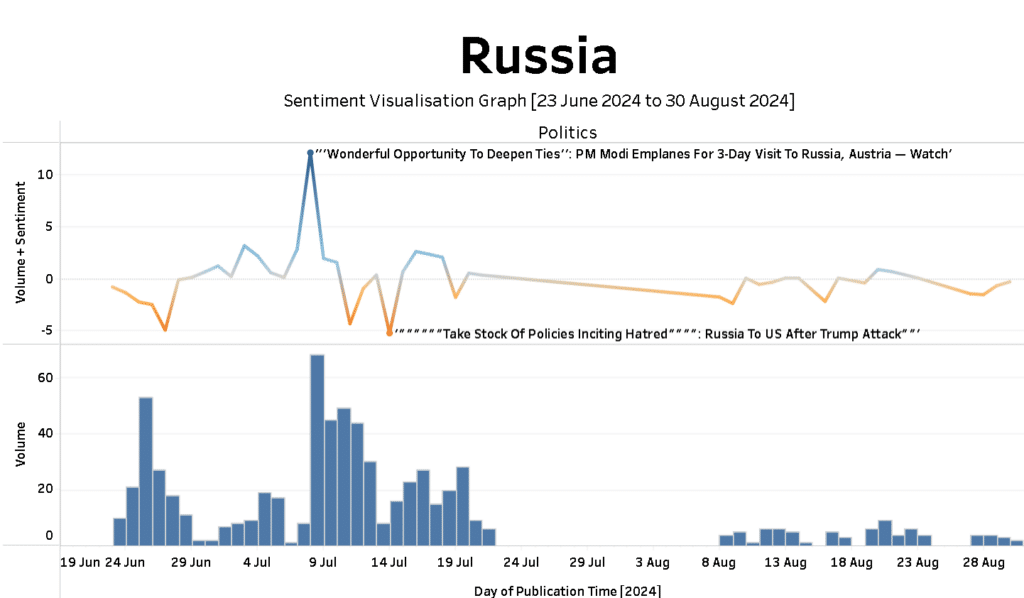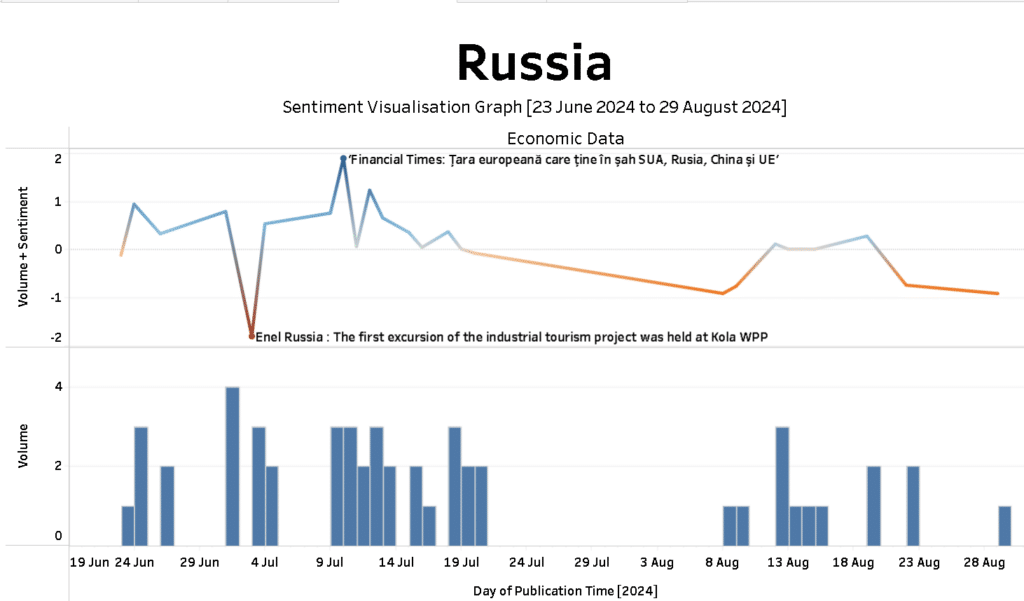Russia stands as one of the most powerful countries in the world, and its choices have a big impact on global politics, money matters, and conflicts. But how does the world see Russia? To answer this question, we analysed global news sources to discover the prevailing news sentiment around the country, looking at data from June to August 2024 in three key areas: war, politics, and the economy.
Using advanced AI, our analysis breaks down the amount and tone of media stories about Russia. This gives us a fact-based grasp of how people see the country in various fields. This article digs into these results and gives a full picture, giving us an answer to the question – how does the world see Russia.
How does the world see Russia in relation to war?
Let’s start with the issue of Russia’s role in war and armed conflict, one of the most divisive topics in today’s global politics. Since it took over Crimea in 2014 and the ongoing strife with Ukraine and Western nations that followed, Russia’s military moves keep casting a dark cloud over how the world sees it.
From June to August 2024, our sentiment analysis unsurprisingly revealed a negative view of Russia in news related to the war. This period was marked by big swings in sentiment due to major events related to military operations and human rights abuses.

How does the world see Russia in relation to war – key findings
Human rights violations in Crimea
Sentiment was markedly negative around Russia after a European court made a decision in late June. The court said Russia had broken a string of human rights laws in Crimea. This news further damaged Russia’s image in Europe and North America, where human rights violations is regarded as an extreme violation of justice.
Nuclear arms discussions
Another major source of negative sentiment bubbled up in July, this time regarding discussions around Russia’s nuclear posture which caused global concern. Russia’s part in this story increased fears in Western countries that its military goals could upset global peace.
Global impact
Our analysis reveals that military actions unsurprisingly shape Russia’s image worldwide as depicted in international media. News about Russia’s ongoing war with the Ukraine and claims of war crimes keep worldwide sentiment toward Russia’s involvement in conflict negative. This shows deep distrust and worry in Western free countries.
But remember, news about Russia always spikes when big military events happen and Russia’s moves will never fail to grab world news attention. This constant news focus keeps Russia in people’s minds globally, albeit for the wrong reasons.
How does the world see Russia in relation to politics?
Russia’s standing on the world stage is tricky to say the least. It has rocky relationships with Western nations but has far more positive relations with non-Western countries like India and China. Our news sentiment analysis reveals the mood regarding Russia in relation to political news from June to August 2024.

How does the world see Russia in relation to politics – key findings
Positive sentiment spikes
At the start of July, sentiment reached its peak due to Indian Prime Minister Modi’s state visit to Russia and Austria. People saw this event as a “wonderful opportunity to deepen ties,” which highlighted how much Russia values its relationships with non-Western powers. India has kept a practical relationship with Russia, striking a balance between working together and considering wider geopolitical interests. The upbeat sentiment shows hope for diplomatic talks between Russia and countries outside the West.
Negative political rhetoric
In contrast to this diplomatic goodwill, the mood soured after Russia criticized U.S. policies. When Donald Trump attacked Russian policy, the Russian government fired back with harsh words. This caused a negative shift in public opinion. This incident shows how the ongoing political friction between Russia and the U.S. still shapes much of the global story, and ultimately, casts a dark cloud over Russia’s political image in Western media.
Global impact
Russia’s political reputation divides opinion worldwide. Western countries view Russia negatively due to political clashes and sanctions that have damaged relationships. Yet, Russia has built good ties with non-Western powers like India and China, proving that not everyone sees the country in a bad light. These friendships give Russia other ways to boost its political power, even though its rocky relations with the U.S. and Europe often sway overall world opinion.
How does the world see Russia in relation to economic indicators?
The world has long kept a close eye on Russia’s economy given international sanctions, changing energy prices, and its huge natural resource deposits. Even with these hurdles, Russia still plays a big role in global energy markets, and news about its economy often catches worldwide attention.
Our news sentiment analysis showed that global media views were steadier compared to war and political areas, with sentiment rising and falling in relation to specific events, but staying more balanced overall.

How does the world see Russia in relation to economic indicators? Key findings
Positive economic developments
At the start of July, people positive was more sentiment after the Financial Times published an article about Serbia’s strategic role in international relations, influencing the United States, Russia, China, and the European Union. It examines how this country navigates geopolitical tensions, impacting the balance of power among these global players.
Negative sentiment around energy projects
On the flip side, sentiment took a hit in late June after news broke about Russia’s Kola WPP (Wind Power Plant) industrial tourism project. The project might have sparked some interest, but the bigger picture includes worries about environmental and energy-related issues in Russia. These concerns echo the ongoing global discussion about Russia’s energy policies and how they affect sustainability and climate change.
Global impact
The world’s view of Russia’s economy stays steady, with ups and downs tied to news stories. Even though its political and military moves often lead to bad press and negative sentiment, Russia’s key role in energy markets ensures it’s still a crucial player in world economics, despite being embroiled in political tensions and conflict.
How does the world see Russia? Summing up
Our news sentiment analysis shows a complex view of Russia worldwide. Russia’s military moves and political strains often lead to negative sentiment in Western news, but its economic power and friendly ties with non-Western countries paint a more detailed and surprisingly positive picture.
Of course, when it comes to war and military action, Russia is seen in a bad light, with news around the world pointing out human rights violations and concerns about nuclear weapons. In politics, Russia’s image goes fluctuates, gaining some diplomatic wins but also harsh criticism. In regards to economic matters, Russia keeps a steadier global image, thanks to its key role in energy, though it faces hurdles related to long-term growth and trade limits.
As with many complex geopolitical situations, the world’s view of Russia depends on the context — whether people see it through the lens of war, talks between countries, or economic matters. Each of these areas helps shape a bigger, ever-changing story about where Russia stands in the world right now.
Surely, then, it’s important to consider all these factors when analysing Russia’s global standing. The obvious point here is that Russia’s image is multifaceted and often contradictory. But also, we must remember that perceptions can shift rapidly in response to world events.
Separately, it’s inevitable that Russia’s actions on the world stage will continue to be scrutinised closely. In essence, the country’s global image is a reflection of its complex role in international affairs. Most importantly, understanding these perceptions is crucial for anyone engaged in global politics or business.
There are two questions that arise from this analysis: How can Russia improve its global image, particularly in the West? And how can other nations engage with Russia constructively while addressing concerns about its actions?
Find out more
Take your strategic decision-making to the next level with our advanced economic and geopolitical datasets. Our in-depth, real-time analytics give you unmatched insights into worldwide market trends, political shifts, and news patterns. Our datasets use state-of-the-art AI tech to analyse sentiment in real-time, predicting economic factors, and assessing geopolitical risks in detail. Be at the forefront of data-driven strategy and get ahead in today’s fast-changing global scene. To see how our capabilities can help stay ahead, simply email us at enquiries@permutable.ai to set up a demo of our services tailored to your needs, or fill in the form below.
Further reading
Looking for more global insights? Why not read our articles on:
How countries of Europe view each other’s economy according to GDP
How the UK’s economy is perceived in Europe
How France’s political situation is viewed
An analysis of sentiment around the UK property market recovery
An analysis of global perceptions towards the Germany economy
